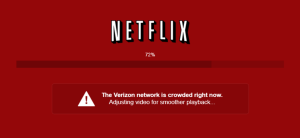How Netflix Maneuvered to Become the Biggest Winner from the FCC’s Net Neutrality Rules
Netflix has acted to subtly reframe the debate in Washington over the Federal Communications Commission’s (FCC) proposed Title II public utility regulation of the Internet in the name of “Net Neutrality.” Netflix, known for its innovation in reshaping the entertainment industry, worked to add unprecedented regulations to new Net Neutrality rules that will cement its power, eliminate its current costs and, in turn, pass those costs onto all Internet users to benefit its bottom line.
Netflix appears set to emerge as the biggest winner from the FCC’s approval of Title II last Thursday.
For Netflix, much is at stake. The company worries that Internet Service Providers (ISPs) might force it into costly deals in the future in order to deliver its traffic faster to the end customer. The FCC is being used by Netflix to ensure it has access to cheap, or zero-cost, video streaming.
Netflix alone takes up as much as 34 percent of Internet bandwidth in the United States during peak hours. Netflix hopes, that under Title II, the current model of how Internet traffic crosses the web will be updated to include government-regulated rates.
At the heart of the matter is “interconnection,” which is how traffic is exchanged across the Internet. Interconnection allows content providers, ISPs and third party Content Delivery Networks (CDNs), to pass traffic around the Internet seamlessly. When traffic going one way is larger than traffic going the other way, there is typically a cost associated with interconnection, as large amounts of data take a toll on infrastructure, requiring upgrades and associated costs to maintain the necessary equipment to handle the traffic.
Under the new regulations, ISPs will likely not be allowed to offer a direct connection to a company like Netflix at any sort of cost, for example, which is a total paradigm shift in how Internet traffic has been exchanged until now. ISPs, unable to recoup costs for delivering such massive data over its infrastructure, will simply pass these costs on to all consumers—and not just Netflix customers.
This is on top of the $11 billion hike in new customer fees the Progressive Policy Institute says will take place under Title II.
As data consumption has continued to spike with the proliferation of video streaming and similar applications, companies like Netflix realized it is more efficient to load content right at the ISP’s front door. This “direct-connect” model is not a new cost, but rather a shifting of existing costs, as Netflix moves the payment from a middle-mile CDN provider, like Level 3, over to the last-mile provider ISP, like Verizon. This is contrary to Netflix’s cries of a “new toll.”
With this new paradigm, the opportunity for regulatory protections that would cement low- or no-cost interconnection for Netflix presents a desirable goal for the company. To maintain its market dominance while securing reduced costs in the long-term, Netflix is pursuing regulation to prevent ISPs from entering into deals as they currently do where market-negotiated terms are agreed upon for needed network upgrades. Thus, FCC regulations would ensure a regulated rate for these deals, with the possibility of that rate being zero.
To achieve these ends, Netflix has spun the public conversation using the populist overtones of “Net Neutrality.”
Steering the Debate
Last June, Netflix blamed ISPs for degradation of video streaming quality. In particular, Netflix displayed a message on customers’ screens blaming Verizon. Later, research from the Massachusetts Institute of Technology and the Center for Applied Internet Data Analysis found that Netflix, not the ISPs, was responsible for the service degradation.
A heated exchange between Netflix and Verizon followed the accusations. A Verizon spokesperson called the message “a Netflix PR stunt” and said, “[I]t seems misleading and could confuse people.”
Essentially, Netflix knowingly throttled, or slowed down, video streaming for its customers by selecting pathways that were congested or clogged, such as those from Level 3, a middle-mile network provider.
According to researchers, Netflix had the option to eliminate the congestion at any time by shifting traffic to less-congested routes. Netflix chose not to eliminate the congestion.
Netflix did not respond to multiple requests for comment on whether it contested the research from MIT. The company also did not respond to a question over whether the marketing effort was deceptive.
The Netflix Throttling Hypocrisy
Experts argue that Netflix has been engaging in the practice of “throttling,” net parlance for intentionally slowing service.
Throttling customers has been central to Netflix policy for some time.
In 2006, USA Today reported that some subscribers complained about offline throttling of DVD rentals. The company gave priority to less-frequent renters. Netflix had to settle a class action lawsuit over this practice.
In 2007, Netflix CEO Reed Hastings responded to critics of throttling by explaining that the purpose of throttling is to give less priority to frequent users and “allocate…new movies to subscribers who have not rented much recently.” Hastings’ response both acknowledged and condoned the practice.
Netflix came under fire in Canada for throttling customers to put pressure on the ISPs to bring about net neutrality rules.
Some call it hypocrisy for Netflix to make ISPs out to be the bad guys for something Netflix has practiced all along.
But while it is expected that the new rules from the FCC will ban throttling by ISPs, Netflix, as a content provider, will be allowed to continue throttling under the new regulations.
International Push for Net Neutrality
Netflix’s throttling of Verizon customers hardly seems an odd ploy when looking beyond North America. The company is known for its tough tactics, such as releasing a monthly speed ranking to try to publicly shame ISPs into signing favorable interconnection deals.
In Norway, Netflix gave Telenor, Norway’s largest ISP, an embarrassingly low 9th place ranking on its speed index.
According to Telenor sources, Netflix gave a “warning that they were going to go out in the media” to embarrass Telenor, unless they agreed to sign a direct interconnection deal with Netflix. Telenor gave in, signing an agreement with Netflix.
Why Netflix Wants Its Own Form of “Net Neutrality”
Netflix has effectively steered the debate to be in favor of the FCC’s Title II public utility regulation of the Internet.
The FCC decision benefits Netflix in at least two ways: First, it reduces Netflix’s cost to link directly with ISPs through unprecedented rate regulation on interconnection, which is crucial for their high-speed video streaming business model.
Such a policy will have tremendous impact on Netflix, which already consumes a third of Internet bandwidth, and will allow the company to continue rapidly expanding before more competition comes along. Hence, the urgency with which Netflix is pursuing the FCC decision, calling the FCC’s attention to the issue in no fewer than 17 lobbyist filings and meetings with the agency.
Roslyn Layton, an Internet policy scholar and American Enterprise Institute (AEI) fellow, said in an interview that, taken together, the impact on consumers would be such that “ISPs can charge customers for a service [Netflix] that only a fraction of Americans actually use.”
With the regulatory advantages given to Netflix, she continued, “no new company can overcome that barrier.”
Since it permits expansion with little concern for increasing costs for massive content delivery, cheap or no-cost interconnection is the best way for Netflix to snuff out competition while it continues to expand.
Netflix Chief Content Officer Ted Sarandos commented in a 2012 interview that he believes cable and network TV will eventually become like TV channels online. And if that happens, “[TV channels] will be less likely to license their content to us.”
Regulated interconnection agreements will let Netflix more cheaply establish strong consumer bonds to their product before “[TV channels] get good at direct-to-consumer relationships, delivery technology, device distribution, encoding and personalized user interface.”
Netflix did not respond to multiple requests for comment on the company’s expected lower costs to provide service, or on the expected higher costs of Internet service for consumers.
Close Ties with the White House and the FCC
It appears that Netflix is on track to get everything it wants from the FCC. Title II public utility regulation, which initially appeared unlikely when Chairman Tom Wheeler released his first draft, has now passed the Commission. Despite this, the final plan has yet to be made public. According to a fact sheet released last month by the agency, the FCC will for the first time in history include Internet interconnection agreements under their purview.
Netflix employees donated to the Obama campaign at one of the highest per-donor averages in Silicon Valley—$1,037, according to data from the Federal Elections Commission. Netflix CEO Reed Hastings gave $5,000 to the Obama campaign in 2012.
Sarandos, the chief content officer for Netflix, is married to Nicole Avant, a political activist who co-chaired Obama’s 2008 southern California finance committee. In 2009, Avant was appointed by Obama to serve as Ambassador to The Bahamas. In 2012, the couple raised over $500,000 for Obama’s re-election. This included hosting First Lady Michelle Obama for fundraising in their Hollywood home.
Several Congressional committees are now examining whether the White House had undue influence over the FCC, an independent agency, in pushing for the new Internet regulations. The committees have requested documents and plan to hold hearings.
Initially, FCC Chairman Tom Wheeler had said that the issue of interconnection would be outside of the FCC proposal. But President Obama later commented that Title II rules should apply in part to interconnection.
Netflix CEO Reed Hastings has spoken on the phone with FCC Chairman Tom Wheeler specifically regarding the issue of interconnection. Wheeler has since indicated that the new FCC regulation applies to interconnection.
Netflix did not respond to requests for comment on its employees’ political giving and efforts to lobby either the White House or FCC on interconnection.
The FCC’s Decision
With 4 million public comments, this action by the FCC has garnered far more interest than any previous FCC action. Wheeler presented a 300+ page proposal for Title II public utility regulation of the Internet on February 5 for a three-week review by his four fellow commissioners.
The FCC proposal still remains private even though it has passed, which according to AEI’s Layton makes it “ironic that the rules of transparency are not transparent.”
Wheeler’s proposal passed in a party-line 3 to 2 vote, and a wave of litigation is set to follow.
Netflix is likely to be the biggest winner. How the regulations turn out for everyone else, particularly the small companies unable to afford an army of lobbyists and lawyers, will be debated for years to come.


